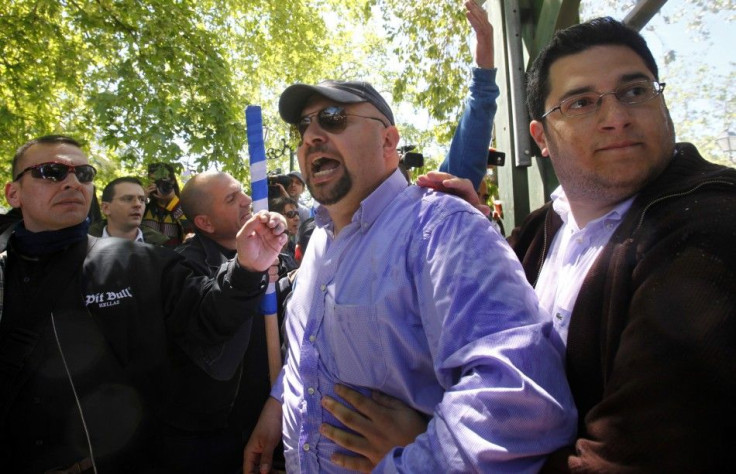Greek Elections: Economic Crisis Raises Profile Of Far Right

With the far-right scoring an impressive first-round performance in France’s presidential election, a similar scenario may play out in Greece, where extreme right-wing parties may win some seats in the Athens parliament in this Sunday’s elections.
Beset by crushingly high unemployment, a brutal economic landscape and draconian austerity measures by the government, the situation in Greece seems ideal for the far right to exploit and gain political power.
Socialist party leader Evangelos Venizelos has seen the writing on the wall and urged the Greek public to reject the extreme right-wing in the upcoming elections.
Venizelos’ Pasok party will likely be blamed by angry Greeks for appeasing the European Union by inflicting such fiscal pain on the country in exchange for huge financial bailouts from Brussels.
As a result, certain fringe parties may attract more support than usual from a fed-up public seeking to make a “protest statement.”
The ultra-nationalist Chrysi Avgi (‘Golden Dawn’) party – which Greek and European media sometimes label as a Neo-Nazi organization -- is expected to gain 5 percent of the total vote, well above the 3 percent minimum required for entering parliament.
It would be the first time Golden Dawn ever entered parliament.
Somewhat similar to France’s National Front party and the UK’s British National party, Golden Dawn vows to deport all immigrants (both legal and illegal) from Greece and carries a banner similar in appearance to the Nazi swastika. In municipal elections in 2010, the party won more than 5 percent of the Athens’ vote, scoring as high as 20 percent in neighborhoods with a high immigrant presence.
Golden Dawn has gained some support among poor Greeks by handing out clothes and food. The party has vociferously attacked the bailouts, austerity and what it sees as foreign domination of Greece’s internal affairs.
In a likely reaction to the Golden Dawn’s virulent anti-immigrant stance, the government recently opened its first detention center for illegal immigrants just outside Athens.
Golden Dawn is an extreme phenomenon, I believe they are an example of fascism and we radically oppose them,” Venizelos told Reuters.
“It's an offense to our history and to parliament, he said in a reference to Nazi Germany’s brutal occupation of Greece during World War II.
We will not allow neo-Nazis to goose-step into parliament with Hitler salutes. Greek society will persevere, it will not submit to fascism.
Venizelos also asserted that in defiance of the extreme right, the overwhelming majority of Greeks support the euro.
Over 75 percent of our people say they are for Europe and the euro. This must be expressed, he said.
The two principal parties that support the austerity program, Pasok and the conservative New Democracy, will need to amass enough support to form a coalition government that will strive to meet the terms of the euro zone bailout. Polls currently suggest New Democracy is in the lead, followed by Pasok. This is a stark reversal of the 2009 election, when Pasok grabbed 53 percent of the national vote, with New Democracy a distant second at 29 percent. (In that election, Golden Dawn gained a paltry 0.3 percent).
Should that fragile alliance break down through defections to fringe parties (virtually all of which reject austerity), Greece may sink into bankruptcy.
The combined support for Pasok and New Democracy barely reaches 50 percent, according to polls.
As a former finance minister, Venizelos might be directly blamed for the harsh terms of the euro zone bailout. With Greece entering a fifth straight year of recession and unemployment running above 20 percent, Venizelos faces the Herculean task of convincing the beleaguered public that austerity and spending cuts are necessary to stage off a bankruptcy.
We are fighting hard to convince the Greek people that the path we follow is difficult but safe, Venizelos said.
I am honest and self-critical but I try to explain that what we did was to protect, not hurt, the Greek people.
The mainstream parties may also see Greek voters defect to the far-left parties, particularly the Communists who play a dominant role in the annual May Day parades across the country and have long protested bailouts and spending cuts.
Aleka Papariga, the general-secretary of KKE (the Greek Community Party) warned that, regardless of who wins the election: “The next government will be dangerous, or it will be useless,” according to Greece’s Ekathimerini newspaper.
Similarly, the head of the Coalition of the Radical Left (SYRIZA), Alexis Tsipras, told a press conference that he urged voters to reject the two principal parties since they have no fundamental differences in terms of policy.
© Copyright IBTimes 2024. All rights reserved.




















